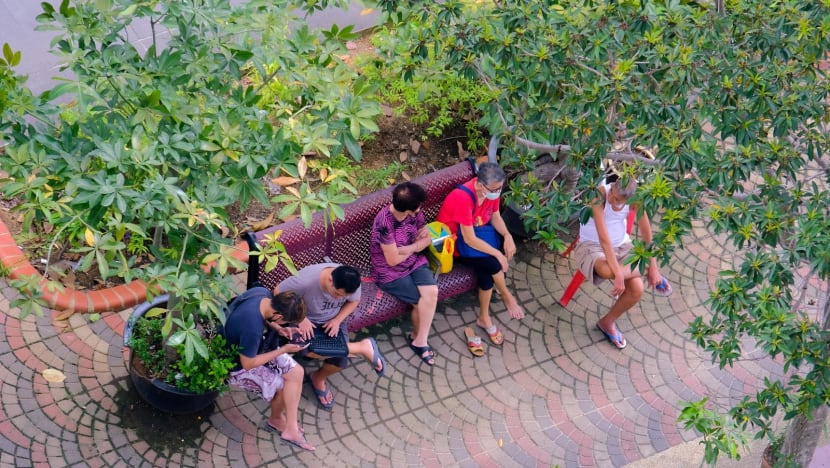MPs welcome new Plus flats category, believe it will help young families, sandwich generation
One MP highlighted that some young working professionals may still feel the pain. They might not be able to afford private property yet also exceed the income ceiling to buy a Plus flat.

File photo of Singapore residents in the heartlands in September 2021. (Photo: iStock/Kandl)
SINGAPORE: Members of Parliament (MPs) told CNA they welcome the new Plus category of Housing and Development (HDB) flats, but some hoped that the changes to public housing policies announced during the National Day Rally on Sunday (Aug 20) could have encompassed a broader scope of issues.
In his National Day Rally speech, Prime Minister Lee Hsien Loong announced that HDB will do away with the decades-old labels of mature and non-mature estates, and replace them with a new classification system.
From the second half of 2024, Build-to-Order (BTO) projects will be classed Standard, Plus or Prime, with different resale conditions attached to each housing type.
The new HDB Plus flats will be within “choicer locations” in each region, such as near MRT stations and town centres.
While Plus flats are subject to greater subsidies, they will also face tighter resale conditions. These flats will have a 10-year minimum occupation period (MOP), and owners will have to return to HDB a portion of the resale price that is reflective of extra subsidies they receive if they choose to sell the flat.
NEW HDB PLUS FLATS HELP YOUNG FAMILIES, SANDWICH GENERATION
The announcement of the Plus flats category “meets the concerns for many Singaporeans who are concerned about whether or not they can afford flats in choice locations”, MP Henry Kwek (PAP-Kebun Baru) told CNA.
He said that the “proposals on how to maintain good social mix, ensure affordability, and ensure the system is fair” resonates with the views that he hears from many Singaporeans in the Forward Singapore conversation.
“When we give more subsidies, it means that people of all income groups can afford a house and it also means that our various HDB estates can continue to have good social mix,” he added.
Asked what he wished could be better about the public housing announcements on Sunday, Mr Kwek cautioned that “housing is something that affects everybody” and that there are “so many dimensions that we have to watch out for”. He added that he “fully agrees” with the “measured approach” to the changes.
“Personally, I believe that we have to take gradual steps and not rush to create too many changes at one shot, because the consequences could be unpredictable,” he said.
Similarly, MP Nadia Samdin (PAP-Ang Mo Kio) pointed out that the introduction of Plus flats would benefit young couples who wish to stay near their family.
“I often have a lot of young people who have come to me and say, ‘I really want to stay near my family. However, I don't have any options.’ Or they feel that they are being priced out of their options,” she said, adding that the Plus category of flats would be good for such couples.
Meanwhile, MP Melvin Yong (PAP-Radin Mas) pointed out that the Plus flats would be “especially beneficial" to his residents because his constituency is located in the central part of Singapore. As a result, the new BTO flats and resale flats “tend to be priced higher”.
“A lot of my residents – both the elderly parents as well as (their) children – will have come to me for help,” he said.
“Parents say, ‘Can you help my children to get a home nearer to me?’; young people say, ‘We have been balloting a lot and we cannot get a flat.’ So sometimes when we advise them to look for (a flat in) what they call a ‘non-mature estate’, they tend to be a lot further.”
Doing away with the decades-old labels of mature and non-mature estates and introducing the Standard, Plus and Prime classification model, “would certainly help hopefully lower the price”, Mr Yong believes.
“And then it will allow my residents a better chance of fulfilling their wish to stay nearer to their parents.”
HOUSING CONCERNS
Families aside, Ms Samdin said she was glad that the Plus flats would benefit singles too “in terms of singles being able to access (public housing) in all locations”. But she highlighted a “certain group of the younger generation who may still feel the pain”.
“For example, (these are) young working professionals who may feel that buying a private property, such as a condo, is slightly beyond their reach, but they feel that they are priced out (of Plus flats) due to the income ceiling,” she explained.
But she acknowledged that “we still will continue to have the existing supply of resale flats which (singles) will not be restricted from (buying)”.
On what singles may have hoped the National Day Rally would cover, Ms Samdin suggested that “maybe singles … were hoping for the (minimum) age (to buy an HDB flat) to be reduced”.
“I think we're not quite there yet. But it is something that has been raised through various conversations, for example, through Forward SG,” she said.
“I think the government takes in feedback from time to time, and any changes have to be incremental. Because the effects are not just for new homeowners, but also existing homeowners – about 80 plus per cent of Singaporeans live in HDB flats today.”
RETIREMENT ADEQUACY
Meanwhile, MP Saktiandi Supaat (PAP-Bishan-Toa Payoh) expressed support for the Earn and Save Bonus, which will be credited to one’s CPF account.
Eligible individuals will receive this bonus yearly as long as they are working, whether it is part-time or full-time work. The yearly bonus is part of the Majulah Package aimed to help Singaporeans in their 50s and early 60s – termed “young seniors” – to cope with the burden of rising living costs and anxiety over retirement. The package will also cover the Merdeka and Pioneer generations.
“It is quite substantial. There is actually some motivation to encourage people to continue working,” said Mr Saktiandi, who also expressed support for the Retirement Savings Bonus.
However, he added that he “would have actually been delighted to hear a bit more details on how retirement adequacy can be enhanced even further”.
People in their 50s to 60s “have a short runway to benefit from some of the CPF changes that have been introduced”, he explained, adding that he believes this group is “the most vulnerable” as they may have to care for children who are still studying as well as their elderly parents.
Mr Saktiandi, who is a trained economist, pointed out that as living costs change, “it’s not just the runway but the inflation trajectory, and profile and the impact … on certain segments has changed”.
“So the retirement element may be impacted. And because this group (those in their 50s to 60s) is the largest, there could be a cliff effect for this group – not just in Singapore, because I think the cliff effect is evident even in other countries for this baby boomer generation,” he added.




















